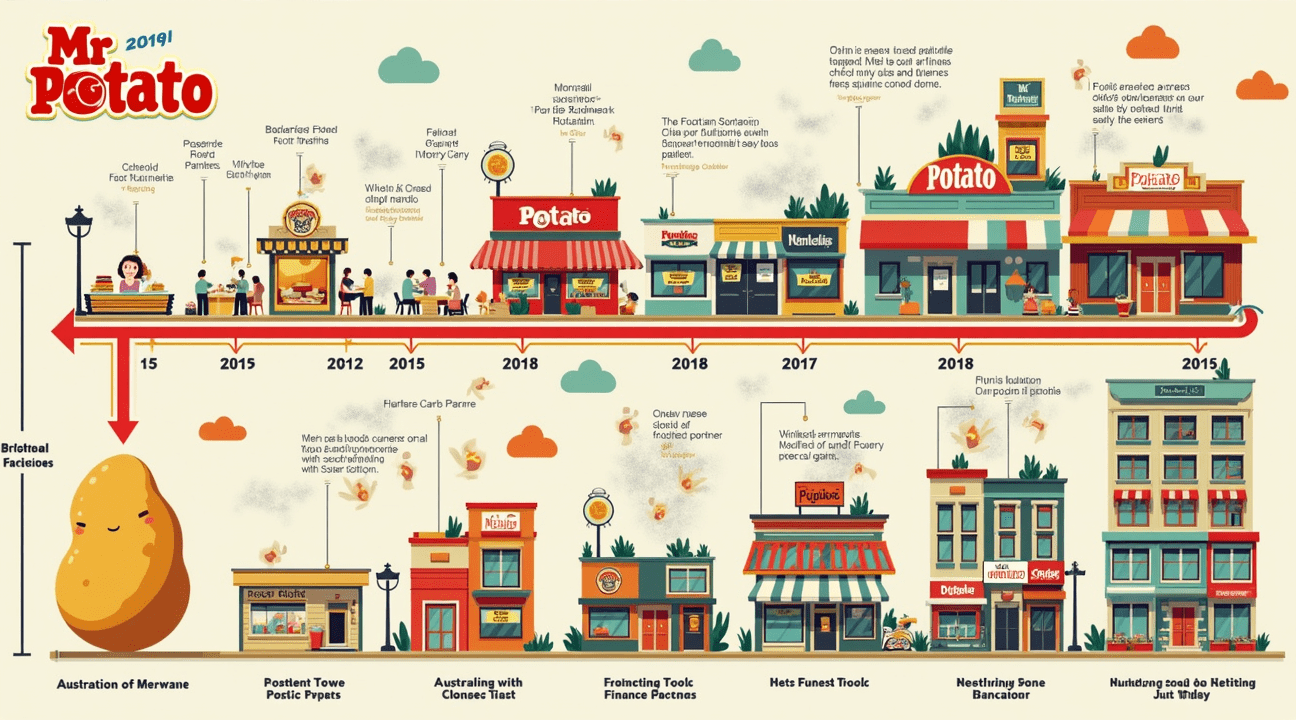Mr Potato’s fast food venture, founded by former Miss Universe contestant Jess Davis and ex-basketball player Tyson Hoffman, experienced a dramatic collapse after just seven years of operation, leaving franchisees bankrupt and the company facing liquidation over unpaid taxes.
Overview of Mr Potato’s Collapse
The potato-centric restaurant chain, which once peaked at 13 locations, ultimately failed to sustain its health-focused concept within Australia’s competitive fast food market. Despite early growth, store numbers plummeted to just four before the business shut down entirely in 2025.
Key Takeaways
- Rapid Expansion and Decline: Mr Potato expanded quickly from its start in 2018 to 13 franchise locations by its peak, but suffered a devastating 69% reduction in stores due to financial difficulties and operational challenges.
- Tax Issues and Liquidation: The company faced liquidation in July 2025 after the Australian Taxation Office initiated court action over a $151,000 tax debt, delivering the final blow to the business.
- Franchisee Financial Hardship: Many franchisees experienced severe financial losses. Some were forced to sell their homes and declare bankruptcy after investing their life savings in the franchise.
- Unprofitable Menu Strategy: Despite offering a customizable baked potato menu priced between $4.98 and $11.98, the brand struggled to remain profitable compared to more established fast food competitors.
- Disappearance of Founders: Celebrity founders Jess Davis and Tyson Hoffman vanished from public sight as the franchise crumbled. The company’s website disappeared from the internet, and the last of the locations closed in February 2025.
Rapid Collapse Leaves Franchisees Bankrupt and Founders in Hiding
Financial Implosion and Legal Troubles
By July 2025, Mr Potato’s management company faced liquidation after the Australian Taxation Office pursued court action over a $151,000 tax debt. This legal pressure became the final nail in the coffin for a franchise system that was already hemorrhaging money. The tax debt represented just the tip of the iceberg, as the company struggled with mounting operational costs and declining revenue across its network.
Franchisee numbers plummeted dramatically from 13 locations to just 4 stores, reflecting widespread financial distress throughout the system. Store owners discovered that the promised profitability simply didn’t materialize, leaving many unable to cover basic operating expenses. The franchise model that once seemed like an exciting opportunity turned into a financial nightmare for investors.
Personal Devastation for Franchise Owners
The human cost of Mr Potato’s collapse extended far beyond simple business failure. Several franchisees found themselves in such severe financial hardship that they had to sell their homes to cover mounting debts. Some faced complete bankruptcy as they attempted to salvage what remained of their investments in the failed potato-based concept.
These franchise owners had trusted the Mr Potato brand with their life savings, believing in the company’s vision for fast food success. Instead, they discovered that the business model couldn’t sustain profitability, leaving them with worthless franchise agreements and substantial financial obligations. The last two Queensland stores closed their doors in February 2025, followed closely by the original Adelaide location that had started the entire venture.
The Mr Potato website disappeared from the internet, effectively erasing the company’s digital presence and signaling the definitive end of operations. This online shutdown left remaining customers and potential investors with no way to contact the company or access information about closures. The founders, who had once promoted their innovative approach to fast food, became notably absent from public view as their franchise empire crumbled around them.
What started as an ambitious attempt to revolutionize fast food with potato-based meals ended as a cautionary tale about franchise investment risks and the importance of sustainable business models in the competitive restaurant industry.
From Miss Universe to Basketball Courts: The Celebrity Founders Behind the Potato Empire
Mr Potato’s origin story reads like a Hollywood script, combining beauty pageant glamour with professional sports athleticism. I find their founding team particularly fascinating because it brings together two distinct entertainment backgrounds that rarely intersect in the fast food industry.
Jess Davis, a former Miss Universe entrant, partnered with Tyson Hoffman (also known as Tyson Finau), a former Adelaide 36ers basketballer, to launch Mr Potato in 2018. Their Adelaide-based venture represented something fresh in Australia’s competitive fast food landscape. Davis brought her media savvy and public relations expertise from her pageant experience, while Hoffman contributed his understanding of athletic nutrition and performance-focused eating habits.
The founders positioned their business concept around a simple yet compelling proposition: fast food doesn’t have to compromise on nutrition. Their potato-centric menu aimed to fill a gap in the market for consumers who wanted convenient meals without sacrificing their health goals. This approach proved particularly smart given the growing trend of health-conscious dining that was gaining momentum across Australia during this period.
Building the Brand Through Strategic Touring
Their most ambitious marketing strategy involved a national food truck tour scheduled from March to September 2025. This grassroots approach allowed the celebrity founders to personally connect with customers across different Australian cities while testing their menu offerings in various markets. The tour strategy served multiple purposes:
- Building brand awareness through direct customer interaction
- Gathering real-time feedback on menu items and pricing
- Supporting local communities through partnerships and events
- Creating social media content and publicity opportunities
- Testing potential locations for future brick-and-mortar establishments
I believe their celebrity status provided significant advantages during this expansion phase. Davis’s pageant background equipped her with natural promotional skills and media connections, while Hoffman’s sports career offered credibility with health-focused consumers. Their combined social media following also provided built-in marketing reach that traditional restaurant startups typically lack.
The timing of their venture coincided with Australia’s growing appetite for healthier fast food alternatives. Unlike celebrity food ventures that often rely purely on star power, Mr Potato’s founders demonstrated genuine commitment to their product vision. Their hands-on approach through the food truck tour showed customers they weren’t just lending their names to the brand – they were actively building it from the ground up.
Their celebrity entrepreneur status helped differentiate Mr Potato in a crowded marketplace, proving that strategic celebrity involvement can enhance rather than overshadow a legitimate business concept when executed thoughtfully.

The Customizable Potato Revolution That Never Took Off
Mr. Potato Head’s venture into fast food represented an ambitious attempt to revolutionize the quick-service industry with fully customizable stuffed baked potatoes. The restaurant chain built its entire concept around the idea that customers could create their perfect meal by selecting from an extensive array of toppings and combinations.
Menu Innovation and Pricing Strategy
The core menu featured 13 distinct types of stuffed baked potatoes, with pricing that reflected the chain’s positioning between traditional fast food and casual dining. Basic options started at $4.98 for a classic baked potato, while premium combinations reached $11.98. Popular offerings included chicken, broccoli, bacon, and ranch combinations that customers could modify according to their taste preferences and calorie requirements.
Beyond the signature potato dishes, the menu expanded to include complementary items like:
- Soups
- Bread bowls
- Slushies
- Soft drinks
This diversification aimed to create a complete dining experience while maintaining the restaurant’s focus on customization. The pricing structure positioned Mr. Potato Head as a premium fast-food option, competing more directly with chains like specialty food concepts rather than traditional burger joints.
Operational Framework and Market Positioning
Mr. Potato Head maintained standard fast-food operating hours, serving customers Monday through Saturday from 10 a.m. to 8 p.m., and Sundays from 11 a.m. to 6 p.m. This schedule aligned with typical quick-service restaurant expectations while accommodating both lunch and dinner crowds.
The restaurant positioned itself as a healthier alternative in the fast-food landscape, emphasizing the nutritional benefits of potato-based meals and the ability to control ingredients. Customers could adjust their orders to meet specific dietary needs, making the concept particularly appealing during an era when health-conscious dining was gaining momentum.
Despite these innovations, the concept faced significant challenges:
- The customization process often resulted in longer wait times than traditional fast food.
- Higher price points made it difficult to compete with established chains offering lower-cost, familiar menu items.
- The novelty of stuffed baked potatoes struggled to maintain long-term customer interest in a market dominated by burgers, pizza, and fried chicken.
Explosive Growth to Spectacular Failure in Just Seven Years
Mr Potato’s journey from startup to shutdown reads like a cautionary tale about the dangers of rapid expansion in the competitive fast food market. The franchise system that initially fueled its growth ultimately became the source of its downfall.
The Rise and Fall Timeline
The restaurant chain’s trajectory followed a pattern that many ambitious food ventures experience. Between 2018 and its peak operational period, Mr Potato managed to establish 13 franchise locations across Australia, demonstrating impressive initial market penetration for a new concept. This expansion rate suggested strong investor confidence and consumer interest in the brand’s unique potato-focused menu offerings.
However, the rapid scaling proved unsustainable as operational challenges mounted. The franchise model, while enabling quick geographic expansion, created vulnerabilities that became apparent when market conditions shifted. Financial pressures began mounting as individual franchisees struggled with profitability issues.
The most telling indicator of Mr Potato’s troubles came in the dramatic reduction of franchise locations. In just one year, the chain witnessed a catastrophic decline from 13 stores to merely 4 operational locations. This represents a 69% reduction in franchise presence, signaling serious systemic problems within the business model.
Several factors likely contributed to this rapid decline:
- Inadequate corporate support systems for franchisees
- Inconsistent supply chains affecting operational performance
- Lack of proven operational procedures across regions
When these essential elements fail, individual franchise owners face mounting losses that force difficult closure decisions. The Australian fast food market’s competitive nature meant that underperforming locations couldn’t sustain losses indefinitely.
The timeline from 2018 to 2025 encompasses the brand’s entire operational lifespan, making Mr Potato a relatively short-lived experiment in the fast food space. Seven years might seem substantial, but in restaurant industry terms, this represents a brief existence that never achieved the stability needed for long-term success.
Franchise growth patterns typically follow predictable stages:
- Initial enthusiasm
- Rapid expansion
- Market saturation challenges
- Stabilization or decline
Mr Potato clearly experienced the first two phases successfully but couldn’t navigate the transition to sustainable operations. The brand’s potato-centric concept may have initially attracted attention, but maintaining customer loyalty in the fast food sector requires consistent execution across multiple locations.
The failure timeline reveals how quickly restaurant chains can unravel once financial difficulties begin. Unlike celebrity brand ventures that might have built-in marketing advantages, Mr Potato relied purely on its food concept and operational execution to succeed.
Market analysts often point to franchise fee structures, ongoing royalty payments, and territory management as critical factors in franchise system failures. When corporate headquarters can’t provide adequate support to franchise partners, the entire network becomes vulnerable to collapse.
The Australian fast food landscape includes established players with decades of operational experience and deep financial resources. New entrants like Mr Potato face the challenge of competing against these veterans while simultaneously building brand recognition and operational expertise. The seven-year operational period suggests the brand couldn’t establish the market position necessary for long-term viability.
Restaurant industry veterans understand that franchise success requires matching expansion pace with operational capacity. Mr Potato’s rapid growth to 13 locations may have stretched corporate resources too thin, preventing adequate support for individual franchise partners. When profitability issues emerged, the lack of strong corporate backing likely accelerated the closure process.
The spectacular nature of Mr Potato’s decline serves as a reminder that fast food success requires more than an innovative menu concept. Sustainable growth demands careful franchise partner selection, comprehensive training programs, ongoing operational support, and financial reserves to weather market challenges. The brand’s inability to maintain even a third of its peak location count demonstrates how quickly ambitious expansion can transform into systematic failure.

How Mr Potato Failed Where Potato Corner Succeeded Globally
Mr Potato’s journey in the fast food industry stands in stark contrast to the remarkable success story of Potato Corner, which has achieved over 1,100 stores worldwide. While Potato Corner built a thriving global franchise empire focused on flavored fries and potato snacks, Mr Potato struggled to gain traction despite positioning itself as a health-conscious alternative in the competitive fast-casual dining space.
Critical Franchise Model Weaknesses
The franchise model that propelled Potato Corner to international success became Mr Potato’s greatest challenge. Unlike successful potato-centric chains, Mr Potato failed to create a sustainable framework that supported franchisee profitability. The company couldn’t establish the necessary infrastructure to ensure consistent returns for franchise partners, leading to limited expansion opportunities and poor brand recognition on a national scale.
Several factors contributed to this franchise model failure:
- Insufficient franchisee support – Mr Potato didn’t provide adequate marketing assistance, operational guidance, or supply chain management.
- Lack of profitability assurance – Franchisees struggled to remain profitable without strong backing and a well-tested business model.
- Weak brand presence – The company failed to achieve broad market penetration, limiting awareness and consumer engagement.
Market headwinds further complicated Mr Potato’s expansion efforts. The brand entered a saturated fast food market at a time when consumers were increasingly drawn to established healthy options or premium fast-casual concepts. Celebrity-endorsed food ventures and other innovative concepts were capturing consumer attention, making it harder for Mr Potato to differentiate itself effectively.
Mr Potato positioned itself as a modern, health-oriented alternative with emphasis on quick service and customizable meals designed for various dietary preferences. The concept focused on offering nutritious potato-based dishes that could be tailored to individual health requirements, targeting the growing segment of health-conscious consumers seeking convenient meal options.
However, this positioning wasn’t enough to overcome fundamental operational challenges:
- The brand struggled to scale due to execution problems.
- Its health-focused identity wasn’t consistently communicated or supported by store-level performance.
- It lacked investor and franchisee confidence due to poor initial returns and weak infrastructure.
The comparison with Potato Corner highlights critical differences in execution and market approach. Potato Corner succeeded by creating a simple, scalable concept with strong franchise support and clear profitability pathways. Mr Potato, despite its innovative health-conscious positioning, couldn’t replicate this formula for sustained growth and ultimately couldn’t compete with both established fast food chains and emerging healthy franchise concepts that offered better support systems and more compelling value propositions for both franchisees and consumers.
The Harsh Reality Behind the Healthy Fast Food Dream
Mr. Potato entered the fast food market with ambitious promises of revolutionizing how Americans ate on the go. I observed how the brand positioned itself as a health-oriented alternative that emphasized quick service while allowing customers to customize meals according to their specific dietary needs and health preferences. The concept seemed brilliant on paper – combining the speed of traditional fast food with the growing demand for nutritious options.
Marketing Promise vs. Business Reality
The health food marketing strategy initially attracted health-conscious consumers eager for convenient, nutritious meals. Mr. Potato’s fast casual concept allowed customers to build their own meals from fresh ingredients, appealing to those following specific diets or simply wanting to avoid processed foods. This customizable approach differentiated the brand from traditional burger chains and positioned it perfectly within the expanding health food market.
However, I noticed that the business model contained fundamental flaws that became apparent after the initial excitement wore off. The complexity of maintaining fresh ingredients while ensuring quick service created operational challenges that many locations couldn’t overcome. The higher costs associated with fresh produce and the labor-intensive preparation methods squeezed profit margins significantly compared to conventional fast food operations.
Franchise Support Failures and Financial Collapse
The franchise support structure proved inadequate for sustaining the ambitious concept across multiple locations. I found that many franchise owners struggled with the demanding operational requirements without sufficient guidance from corporate headquarters. Training programs fell short of preparing staff for the complex food preparation processes, while supply chain management became increasingly difficult as the network expanded.
Profitability issues plagued locations from early in their operations. The higher food costs, combined with labor-intensive meal preparation, made it challenging for franchise owners to achieve sustainable profit margins. Many locations found themselves caught between maintaining quality standards and controlling costs, ultimately failing at both objectives.
Financial hardship spread throughout the franchise network as store after store closed their doors. Franchise owners who had invested their savings into what seemed like a promising concept found themselves facing significant losses. The widespread closures created a cascade effect, further damaging the brand’s reputation and making it even more difficult for remaining locations to attract customers.
The gap between marketing promises and operational reality ultimately doomed Mr. Potato’s fast food ambitions. While consumers initially embraced the health-focused concept, the business couldn’t deliver consistent quality and service at competitive prices. This mismatch between customer expectations and actual execution, combined with inadequate franchise support, led to the brand’s rapid decline in the competitive fast food landscape. Food industry ventures require more than good intentions to succeed in today’s market.
Sources:
7News – “Mr Potato management goes into liquidation after court action over tax debts”
WJON – “Mr Potato joins St. Cloud’s Crossroads Center food court”
Sydney Times – “Founders of Mr Potato Jess Davis and Tyson Hoffman announce inaugural national food truck tour”
Wikipedia – “Potato Corner”


